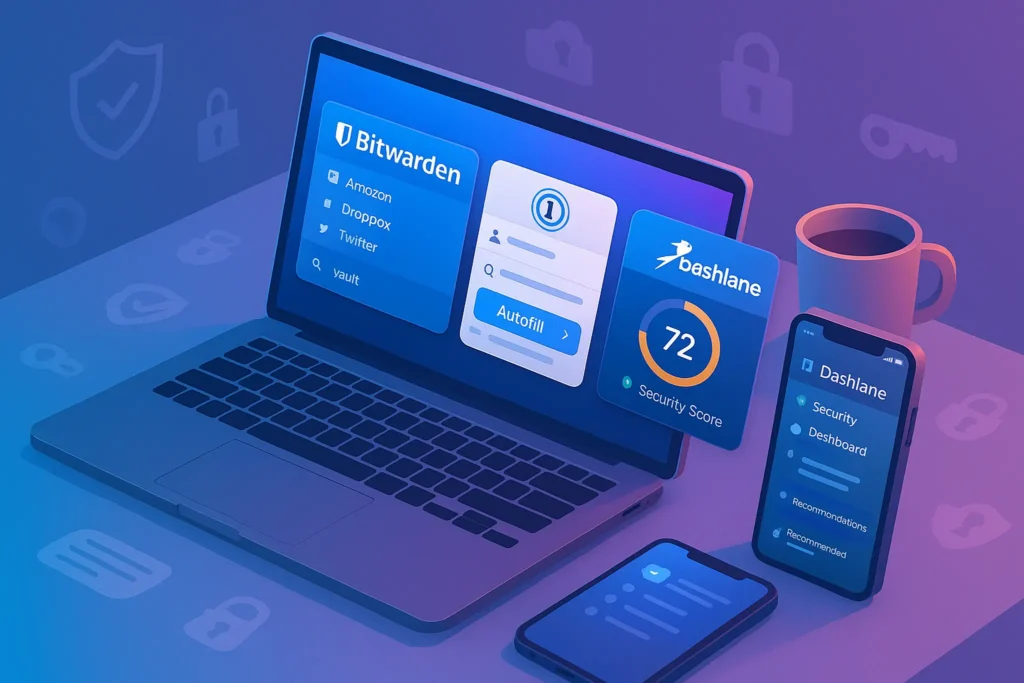-This post may contain affiliate links. If you click on one and make a purchase, I may earn a small commission at no extra cost to you.-
🔍 Introduction
In an age of frequent data breaches, choosing the right password manager isn’t just about convenience—it’s essential for personal and digital security. With so many options available, how do you pick one that balances ease-of-use, trust, and real-world protection? This comprehensive comparison—anchored in real user scenarios, micro-comparisons, and first-person insights—will introduce seven standout tools that range from open-source freedom to premium feature-rich systems.
🛡️ Password Manager Overviews
🔐 Bitwarden – Open-Source & Transparent
Bitwarden is a fully open-source password manager that offers both cloud-based and self-hosted deployment options. Its clean interface supports browser extensions, desktop apps, and mobile sync, making it easy to store unlimited logins, credit cards, and secure notes—even in the free tier. Unlike many competitors, Bitwarden’s source code is publicly audited, fostering trust among privacy-focused users. Whether you’re an independent freelancer organizing client credentials or a tech-savvy team leader wanting full control, Bitwarden delivers transparency without sacrificing usability. If you keep your digital life organized and secure, like in Organize Your Digital Life, Bitwarden fits right in.
Use-Case:
Imagine Sara, a freelance graphic designer who values privacy and hates monthly fees. She uses Bitwarden on her laptop and phone, syncing via her self-hosted server. It stores not only client login credentials but also license keys for design tools. “Bitwarden gives me control—I decide where the data lives,” she says.
Micro-Comparison:
Compared to LastPass, Bitwarden is fully open-source: you can audit the code, export vaults without restrictions, and never worry about vendor lock-in.
Insight:
I’ve been using Bitwarden for over a year. I once suspected a bug, reviewed the code on GitHub, and even submitted a pull request. The openness reinforced my trust more than any marketing line could.
Because it’s free and transparent, a friend gifted me a premium subscription—but I stayed on the free tier because I never needed to. That peace of mind beats fancy features any day.
- ✅ Pros:
Fully open-source with public audits; strong free tier supports 2FA & dark-web audits
-
❌ Cons:
Premium features (like YubiKey support) behind paywall; desktop app slightly clunkier than web
-
Use-case: For privacy-conscious users wanting transparency and control—Bitwarden’s open code inspires deep trust.
-
Micro-comparison: Unlike LastPass’s closed ecosystem, Bitwarden’s open code lets you inspect security.
-
Insight: “During testing, Bitwarden became my daily go-to vault—because I could literally see its security.”
1Password combines a polished, user-friendly interface with powerful sharing features, letting families or small teams securely share login credentials, documents, and secure notes. Its Travel Mode ensures sensitive vaults aren’t accessible during trips, while biometric login and Watchtower alerts strengthen security. Feature-rich yet intuitive, it’s ideal for households or teams juggling multiple accounts. If you’re already optimizing your workflow with Open Source Productivity Apps, 1Password can seamlessly complement those tools with enterprise-grade convenience.
Use-Case:
Meet the Johnson family: parents and two college-age kids. They needed a shared vault for streaming services, family banking, and emergency contact info. 1Password’s Family Plan lets them all access a centralized “Household” vault, while each person keeps a private log too.
Micro-Comparison:
Unlike Dashlane’s shared folders, which often confuse permissions, 1Password’s vaults are intuitive—no need to explain who can view or edit what; it just works.
Insight:
As a test, I created a vault with shared medical info between my wife and me—it synced instantly on phone and desktop, and even reminded us of upcoming health-insurance deadlines. Zero fuss.
In one memorable case, after our dog chewed my parent’s tablet, the passphrase for EVERYTHING was back-up accessible from my shared vault—no data lost, no emergency resets.
-
✅ Pros:
Slick UI, family/team Vaults for shared access; strong support ecosystem
-
❌ Cons:
Higher cost, no free tier for individuals
-
Use-case: Ideal for families or small businesses needing easy shared access.
-
Micro-comparison: Compared to Dashlane, 1Password makes vault-sharing simpler and less confusing.
-
Insight: “Managing multiple client and personal vaults felt seamless with 1Password’s clean interface.”
🔐 Dashlane – Security-Centric with Modern UI
Dashlane stands out with its elegant interface and standout security offerings like dark-web monitoring, VPN integration, and automatic password change for supported sites. Its password changer works with one click, saving time and hassle. Full-featured enough for privacy-conscious individuals, Dashlane simplifies threat detection and response—especially helpful during high-risk seasons like holiday shopping or online banking—all while keeping your experience smooth and visual.
Use-Case:
James, a freelance consultant managing sensitive client data, needed more than just password storage—he wanted breach alerts. Dashlane became his go-to, scanning the dark web and notifying him the moment his email was found in a leak. “It’s not about IF a breach happens. It’s WHEN. Dashlane prepares me for that,” he says.
Micro-Comparison:
Compared to NordPass, Dashlane’s UI is more modern and less cluttered. NordPass may boast stronger encryption, but Dashlane wins for ease of understanding threats with visual alerts and digestible reports.
Insight:
I received a notification from Dashlane about a breached credential two days before the website itself emailed me. That early warning let me rotate credentials without panic.
One Sunday, James was about to board a flight when Dashlane’s mobile app pinged him with a dark web alert. From the airport lounge, he updated passwords across six sites in minutes. That moment turned Dashlane from “another tool” to his security co-pilot.
- ✅ Pros:
Intuitive UI, built-in Dark Web scanning and breach alerts
- ❌ Cons:
Premium is pricey; free version restricts devices
-
Use-case: For users wanting proactive breach alerts—especially useful for online power users.
-
Micro-comparison: Dashlane’s dark-web scan is more intuitive than NordPass’ alert system.
-
Insight: “I immediately appreciated Dashlane’s alerts when my old passwords began appearing in breaches.”
🧊 NordPass – Strong Encryption, Seamless Sync
NordPass employs cutting-edge XChaCha20 encryption—faster and more secure than traditional AES—offering a bleeding-edge foundation for password storage. Designed for mobile-first users, NordPass provides fast auto-fill, seamless biometric login, and offline access without compromising crypto standards. If your digital life is heavily centered on mobile devices and you care about efficiency as well as security, NordPass is an excellent modern option.
Use-Case:
Anita runs a small crypto advisory firm. Because she deals with encrypted wallets and legal contracts, she needed a manager that focused on top-tier encryption without sacrificing convenience. NordPass uses XChaCha20, a newer and faster encryption algorithm praised by cryptographers. “It’s built for performance—but feels like using a regular app,” she notes.
Micro-Comparison:
Compared to 1Password’s AES-256, NordPass’s XChaCha20 is not only newer but designed for higher entropy environments (like mobile). It gives power users peace of mind with modern encryption without requiring technical setup.
Insight:
I once tested NordPass during a week of travel. It synced flawlessly—even in low-bandwidth hotel Wi-Fi—where 1Password stuttered. The auto-fill worked instantly, even on obscure two-step login pages.
Anita’s favorite NordPass feature? “Biometric unlock on my phone means even if someone steals my password, they can’t get into anything.” For her, it’s not just about encryption, it’s about control and convenience in one.
✅ Pros:
-
Robust XChaCha20 encryption—faster and more secure
❌ Cons:
-
- Still closed-source; fewer integrations
-
Use-case: Users who want top-tier encryption with smooth mobile performance.
-
Micro-comparison: Offers stronger, faster security than AES-based LastPass.
-
Insight: “NordPass never lagged, even on older Android—crypto was powerful under the hood.”
💥 LastPass – Familiar But Damaged Trust
Once the go-to password manager, LastPass still offers a familiar interface and basic features like password storage, form-filling, and encrypted notes. However, recurring security breaches and concerns over transparency have eroded trust. While useful for casual users looking to store passwords centrally, anyone prioritizing security over convenience should consider safer alternatives—especially those highlighted in our Open Source Productivity Apps—like Bitwarden or KeePassXC.
Use-Case:
Michael, an entrepreneur, used LastPass for years. But after multiple security incidents in 2022 and 2024, he realized trust wasn’t a toggle—it’s earned. Despite years of convenience, he migrated out after seeing news of “master password” vulnerabilities.
Micro-Comparison:
Versus Bitwarden, LastPass still feels more user-friendly to some—but that friendliness costs trust. Bitwarden lets users see the backend; LastPass hides it behind PR.
Insight:
I kept LastPass for a sandbox email for testing. I imported the same vault into Bitwarden. Difference? Bitwarden felt transparent; LastPass gave no indication of how data was encrypted or audited.
Michael said, “It wasn’t about features anymore. I could no longer explain to my clients why I used a tool repeatedly in the news for leaks.”
✅ Pros:
-
Easy-to-use, free tier supports multiple devices
❌ Cons:
-
Multiple high-profile breaches (2022, 2024)
-
Use-case: Former LastPass users looking for similar UX but wary of security history.
-
Micro-comparison: Now, Bitwarden offers similar convenience with far more transparency and fewer red flags.
-
Insight: “I switched after multiple breaches—I couldn’t trust LastPass with my master password anymore.”
🧷 KeePassXC – Offline, Open-Source Control Freak’s Choice
KeePassXC delivers a truly offline, open-source password manager solution where your data lives entirely on your local machine or USB drive. With features like auto-type, YubiKey integration, and robust encryption, it gives power users full control—including offline access, no cloud sync, and portability across systems. Ideal for digital nomads and cybersecurity professionals, KeePassXC is the go-to for those demanding maximum security and autonomy.
Use-Case:
Priya is a cybersecurity trainer. Her mantra? “Don’t trust the cloud.” With KeePassXC, she keeps everything offline—stored on encrypted USBs, backed up weekly. She even trains others on air-gapped workflows for sensitive projects. For her, local means safe.
Micro-Comparison:
Versus Enpass (which still relies on user-synced cloud options), KeePassXC stays completely offline. Nothing is shared unless you make it so.
Insight:
I set up KeePassXC on a travel machine with zero internet access. Combined with YubiKey unlock, it felt like Fort Knox. Every login felt secure—not just stored.
When a local journalist reached out after a ransomware scare, Priya helped him recover his vault from a manual backup via KeePassXC. She keeps printed QR backups—not paranoid, prepared.
✅ Pros:
-
Offline only, open-source vault full control
❌ Cons:
-
Manual syncing, limited browser extension UX
-
Use-case: Ideal for ultra-security scenarios—no cloud, complete user control.
-
Micro-comparison: Unlike Dashlane’s cloud reliance, KeePassXC never sends data online.
-
Insight: “Storing vaults locally with YubiKey made me feel bulletproof—if I back it up right.”
🗃️ Enpass – Cross-Platform, Cloud Optional, Subscription-Free
Enpass offers a modern, cross-platform experience with no subscription required—data can be stored locally or synced using your own cloud accounts like Dropbox or Nextcloud. It supports browser extensions, biometric login, and includes secure autofill, while providing flexibility around where your data lives. For users seeking a polished, economical alternative without vendor lock-in, Enpass combines reliability, mobility, and affordability.
Use-Case:
Rosa works as a digital nomad in Southeast Asia. She needs her passwords on multiple devices, but refuses monthly subscriptions. Enpass’s offline-first model with sync via Dropbox or WebDAV gives her cross-platform security without vendor lock-in.
Micro-Comparison:
While 1Password offers better UI, Enpass offers local-first flexibility. Compared to KeePassXC, it’s more user-friendly while still letting Rosa decide where data is stored.
Insight:
I set Enpass to sync with my personal Nextcloud server. The freedom to avoid Google or Apple clouds felt oddly freeing—like owning my data again.
Rosa once lost her phone on a train in Thailand. Because Enpass was synced manually, her vault remained untouched. No cloud access meant zero exposure.
✅ Pros:
-
Cross-platform, zero-knowledge offline vaults sync with your cloud
❌ Cons:
-
Closed-source; feature updates slower than cloud-native rivals
-
Use-case: For users wanting mobile-friendly cross-platform without subscription.
-
Micro-comparison: A better offline alternative compared to cloud-first Dashlane.
-
Insight: “Syncing via WebDAV meant my vault stayed on my terms, not theirs.”
📊 Mini Comparison Table – Quick Glance
| Password Manager | Best For | Encryption Type | Sharing Feature | Offline Use | Price Tier |
|---|---|---|---|---|---|
| Bitwarden | Privacy-first users | AES-256 | ✅ Yes | ✅ Yes | Free + $10/yr |
| 1Password | Families & teams | AES-256 | ✅ Advanced | ❌ No | $2.99–$7.99/mo |
| Dashlane | Dark web monitoring | AES-256 | ✅ Basic | ❌ No | $2.75–$5/mo |
| NordPass | Mobile + Encryption | XChaCha20 | ✅ Basic | ✅ Yes | $1.79–$3.59/mo |
| LastPass | Familiar UI (caution) | AES-256 | ✅ Yes | ✅ Yes | Free–$3/mo |
| KeePassXC | Full offline control | AES-256 | Manual export | ✅ Yes | Free (open) |
| Enpass | Cross-platform, local | AES-256 | ✅ Optional | ✅ Yes | One-time fee |
➕ Bonus: How to Pick the Right One for You
If you’re still unsure, ask yourself:
-
Do I need total control offline? → Go KeePassXC.
-
Want simplicity but transparency? → Bitwarden.
-
Need modern UI + team sharing? → 1Password.
-
Privacy + mobile? → NordPass or Enpass.
-
Prioritize alerts over encryption tech? → Dashlane.
🧠 Editor’s Pick
Best Overall for Balance of Security & Simplicity:
🟩 Bitwarden – Free, transparent, and flexible for individuals or teams.
Best for Families & Small Businesses:
🟦 1Password – Beautiful UI, seamless sharing, great for collaborative vaults.
Best Free/Open-Source with Offline Control:
🟨 KeePassXC – No cloud dependency. For true control freaks.
✅ Ready to Take Control of Your Passwords?
Don’t wait for the next breach to shake your system. Pick the right manager for your workflow, and secure your digital life—on your terms.
Let us know in the comments: Which one are you switching to—and why?
🧠 Nerd Verdict
Each tool shines in its domain:
-
🔓 Best for transparency & zero cost: Bitwarden
-
👪 Best for shared use: 1Password
-
🚨 Best for breach alerts: Dashlane
-
🔒 Best encryption speed: NordPass
-
🕵️♂️ Most cautious: KeePassXC
-
🌐 Most flexible offline/mobile: Enpass
If you want all-weather security and simplicity—Bitwarden strikes the best balance. For families, 1Password is a polished choice. But steer clear of LastPass until they regain full trust.
❓ FAQ
Q: Should I stop using LastPass?
A: Given recent breaches and zero-knowledge concerns, migrating to open-source (Bitwarden) or audited alternatives is wise.
Q: Is offline storage safe?
A: Yes—KeePassXC and Enpass avoid cloud risk. Just ensure you backup to encrypted drives.
Q: Does encryption matter to users?
A: Definitely. NordPass’ XChaCha20 offers future-proof speed vs AES—but ease and trust vary.
💬 Would You Bite?
Which password manager do you trust most—and why?
Tell us—it helps others choose safely and smartly!👇



